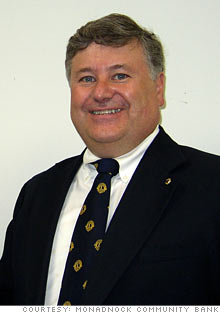Banks leery of Treasury's small business lending plan
President Obama's plan would give community banks access to low-cost capital for small business loans, but banks are wary of taking TARP funds.
 |
| Capital Pacific CEO Mark Stevenson took TARP funds last year but isn't sure he wants any more. |

 |
| William Pierce, the CEO of Monadnock Community Bank, says his staffers are too busy making loans to deal with the regulations that come with TARP funds. |
NEW YORK (CNNMoney.com) -- Small business lending has been in freefall since the recession began. Concerned about the obstacles that places in the way of economic recovery, President Obama recently proposed a new federal effort to give community banks access to ultra-cheap government loans, which they can then use to expand their local business lending.
One hitch: Bankers are lukewarm on the idea.
Obama's plan, announced Oct. 21, calls for letting banks with less than $1 billion in assets borrow money from the government at a 3% dividend rate. To qualify, banks will need to submit a plan illustrating how they'll use the borrowed money to expand their small business lending. The cash will come from the Treasury's Trouble Asset Relief Program (TARP).
That's raising red flags with banks that have previously borrowed from TARP.
For instance, Monadnock Community Bank CEO William Pierce took $1.8 million in TARP funding in December for his Peterborough, N.H., bank. He's not interested in another round.
"For a bank our size, it is too much extra regulation," Pierce said. "We have 25 full-time equivalent employees here, and most of them are working with customers and actually making loans, so to deal with the regulations is very taxing on a small organization."
Capital Pacific Bancorp in Portland, Ore., received TARP funds late last year totaling $4 million. The bank took the loan to boost its capital reserves and grow its balance sheet, but CEO Mark Stevenson is leery of the public backlash the program has sparked since then.
"TARP was advertised to healthy banks: an investment we would use for appropriate purposes," Mark Stevenson said. But now, "TARP has a negative stigma -- it is associated with 'bad bank, bailout.'"
The Treasury Department is still working out the details of Obama's proposed lending plan -- the coffers aren't open yet. Program specifics will be available "very soon," Treasury spokeswoman Meg Reilly said.
Even if the program terms are attractive -- and a 3% rate is pretty tough to beat, Stevenson acknowledged -- banks face another hurdle: Finding qualified borrowers. At many small businesses, sales are down, and the ongoing economic weakness has reduced the value of real estate, inventory and other assets business borrowers typically use as collateral against loans.
Capital Pacific's loan portfolio has been flat this year. Demand from existing clients is down, and the community bank has been working to shore up its balance sheet, cutting the credit lines of customers likely to default. But the bank is still issuing new loans to qualified borrowers: In the first nine months of this year, $26 million of the bank's $135 million in total lending went to brand-new customers.
"I don't know whether we would or we wouldn't [take more TARP], because our capital is still strong today," Stevenson said.
Shane Bell, CFO of First Bank in Strasburg, Va., is in a similar spot. "It is interesting what you hear on the news compared to what you hear on Main Street," he said. "There isn't a lot of loan demand."
First Bank borrowed $13.9 million from TARP in March. Even at lower rates, the bank might not go back for more money, Shane said. It already has enough capital on hand to meet the loan demand from the credit-worthy borrowers in its community.
"There is not a whole lot walking in the door right now," he said.
Obama's new lending program could find itself caught in the same bind that has plagued another high-profile government effort to shore up small business lending: The America's Recovery Capital (ARC) loan program. Created in February as part of the Recovery Act and run by the Small Business Administration, the ARC program offers participating banks a 100% guarantee on loans made to viable but struggling businesses.
It took four months for the government to create guidelines for the ARC program, and once it did, relatively few banks signed on. The program is a safe one for banks -- if the borrower defaults, the government will repay the loan -- but it carries heavy administrative overhead for a fairly scant profit. And because the government doesn't want to lose too much taxpayer money paying off loans that go bad, it set the qualification standards for ARC loans fairly high. The end result was a program that frustrated both borrowers and lenders.
As it crafts regulations for the new lending program, the Treasury will be hard-pressed to steer clear of similar pitfalls. An earlier Treasury program intended to add liquidity to the small business lending market by purchasing SBA-backed loans from banks stalled in part because small banks didn't want to tangle with TARP red tape.
They're right to be wary, said Monadnock Bank's Pierce. Two months after the first TARP loans went out, the Treasury placed executive compensation caps and other regulatory restrictions on banks that had accepted the funds. While his bank wasn't seriously affected by the changes, Pierce was annoyed to have the government changing the rules after the fact.
But the biggest hurdle will simply be finding qualified borrowers. Hit by rising defaults and determined to shore up their underwriting standards, many of the nation's biggest banks have scale back their small business lending. Community banks, traditionally more conservative, have been cautious as well.
"We are still lending if there is a business that meets our reasonable requirements for risk," said Shane of First Bank.
"A lot of the small businesses are holding back -- they are reluctant to make additional investments in their companies," Pierce said. "There is plenty of money around to loan. We would love to do it." ![]()
-
The Cheesecake Factory created smaller portions to survive the downturn. Play
-
A breeder of award-winning marijuana seeds is following the money and heading to the U.S. More
-
Most small businesses die within five years, but Amish businesses have a survival rate north of 90%. More
-
The 10 most popular franchise brands over the past decade -- and their failure rates. More
-
These firms are the last left in America making iconic products now in their twilight. More










